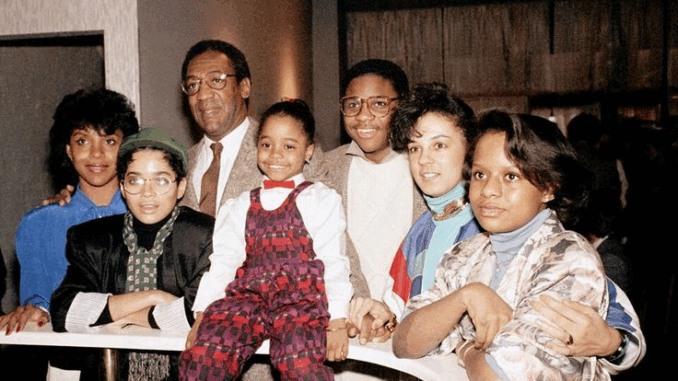
Decades after its reign as a television titan, “The Cosby Show” continues to fascinate and, increasingly, disturb. What was once a symbol of wholesome family entertainment is now viewed through a fractured lens, tainted by the horrifying allegations against its star, Bill Cosby. But beyond the well-documented accusations, could there be a more insidious layer to this beloved sitcom? Was America’s favorite family harboring a dark secret that we, the viewers, were completely oblivious to?
From 1984 to 1992, the Huxtables were our weekly dose of aspirational Black family life. Cliff and Clair’s witty banter, Theo’s relatable struggles, and the infectious charm of the entire clan captivated audiences. “The Cosby Show” wasn’t just a hit; it was a cultural phenomenon, lauded for breaking down racial stereotypes and offering a positive portrayal rarely seen on mainstream television.
But now, the rosy picture has been brutally shattered. The numerous accounts of sexual assault against Bill Cosby have cast a long, dark shadow over the show’s legacy. This forces us to ask uncomfortable questions: Could the seemingly perfect world of the Huxtables have been a carefully constructed facade? Were the very values the show championed – trust, respect, and family unity – tragically ironic in light of the accusations against its leading man?
Consider the power dynamics at play. Bill Cosby wasn’t just the star; he was a powerful force behind the show. Did this influence seep into the narrative in ways we didn’t recognize at the time? Were there subtle undertones, now chillingly apparent, that hinted at a darker reality behind the scenes?
This isn’t about simply acknowledging the allegations; it’s about daring to question the very fabric of “The Cosby Show.” Could the writers, consciously or unconsciously, have woven elements into the storylines that now take on a disturbing new meaning? Were the characters, so carefully crafted and beloved, unknowingly participating in a grand illusion?
The enduring popularity of “The Cosby Show” in reruns, despite the controversy, speaks to its powerful grip on our collective memory. But perhaps it’s time to watch with a more critical eye, to dissect the narratives and the performances, searching for any cracks in the seemingly perfect veneer. Could the “shocking truth” be that the darkness we now associate with Bill Cosby was always lurking beneath the surface of America’s favorite family?
This exploration isn’t meant to erase the show’s cultural impact. Instead, it’s a call to confront the uncomfortable reality that even the most beloved narratives can be deeply flawed, and that the secrets hidden behind the smiles can be far more sinister than we ever imagined. The legacy of “The Cosby Show” is no longer just about laughter; it’s about the unsettling questions it forces us to ask about power, perception, and the darkness that can hide in plain sight.
